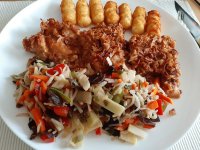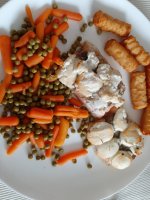Let me start by saying I am not a doctor, nor a dietitian or a scientist, the best I can offer is that I am a man of science and that I have studied Intermittent Fasting now for more than 18 months by reading research papers and watching YouTube videos of scientists who are the best in their field regarding the subject. If you have an eating disorder, pregnant, breastfeed or are under the age of 21 you should not do Intermittent Fasting!
Last time I visited Universal Studios Orlando I sat in a EV due to multiple illnesses. These are arthritis, asthma, osteoporosis, sleep apnea, high blood-pressure and more. I can do about 3 hours in the park and had to take 2 days of rest and that was pushing it for me. I had problems fitting in a ride vehicle due to being too fat.
About 2 more years passed and my weight gained and medication grew. I felt terrible all the time, was constantly in a lot of pain and was exhausted.
Then I heard someone talk about intermittent fasting and it got me interested. There are a few things that caught my attention;
1. It is NOT a diet
2. It doesn't cost money
3. You'll loose weight
4. It has huge health benefits
5. You don't need to exercise
For a fat guy sitting in a chair, all day, in pain, it was worth a try.
It's also very simple. You eat a certain amount of time and after that you don't eat. You can drink water, tea, koffie or diet soda but nothing with sugar in it. A popular version in 16/8 where you don't eat for 16 hours and you eat for 8 hours. That doesn't mean you can snack away in these 8 hours, just eat a regular meal. But there are many more variations like OMAD (One Meal A Day) and it is just that, you eat 1 meal and that is it, simple.
I found out that autophagy (this is when the body breaks down bad cells and replace it with good cells) goes in high gear after about 18-20 hours of fasting. In overdrive is more than 200%! As I explained I was obese and my body was broken so it could use a long fast and I was going to try to do the OMAD thing but started with 20/4 so after the start of my meal I had a bit less than 4 hours to eat something more. I did that for 3 days and decided that the one meal was more than enough. The funny thing is that after those 3 days I started to feel good, much better, even tough I was still fat.
I continued this OMAD thing and in the beginning I graved food. I tried to feel if it was hunger or addiction and it was the last. Not strange as in research it's proven that there are connections made in your brain by eating high carbs food that as similar to the patterns in addictions for drugs of alcohol. When I ignored them these feelings went away within 5 minutes, sometimes they came back but like a wave the went away.
The strangest thing was that I didn't feel hunger but then I remembered my body was still eating when I was not. After about 8-10 hours the food you eat is gone and your body needs a different fuel and I had a ton of it in the form of body fat.
I lost in 1 year 30 kilo/66,14 lb. I could stop my blood-pressure medication, I use half of my arthritis and asthma medication and these illnesses are less severe and attacks are shorter and less impactful. My bone density is only 0.1 below normal and I expect that this will become normal. My parents did the same and had similar results. My dad (78) cured from his diabetes and his arthritis saw the same result and my mom's (76) fibromyalgia is less severe and her asthma had the same result as mine. We all are more active and feel much better and we all lost weight.
I never thought I would visit a theme park ever again but now I have a future and it's one that has a theme park visit in it.
The shocking thing to me is that no doctor or anyone told me that this existed. I lost 2 nieces from cancer, a friend who had ALS and met a lot op people who where as ill as I was and they all could have been so much better off. It works for everything and although it doesn't cure everything the improvements and quality of life has been huge.
If you want to know more, please let me know.
Last time I visited Universal Studios Orlando I sat in a EV due to multiple illnesses. These are arthritis, asthma, osteoporosis, sleep apnea, high blood-pressure and more. I can do about 3 hours in the park and had to take 2 days of rest and that was pushing it for me. I had problems fitting in a ride vehicle due to being too fat.
About 2 more years passed and my weight gained and medication grew. I felt terrible all the time, was constantly in a lot of pain and was exhausted.
Then I heard someone talk about intermittent fasting and it got me interested. There are a few things that caught my attention;
1. It is NOT a diet
2. It doesn't cost money
3. You'll loose weight
4. It has huge health benefits
5. You don't need to exercise
For a fat guy sitting in a chair, all day, in pain, it was worth a try.
It's also very simple. You eat a certain amount of time and after that you don't eat. You can drink water, tea, koffie or diet soda but nothing with sugar in it. A popular version in 16/8 where you don't eat for 16 hours and you eat for 8 hours. That doesn't mean you can snack away in these 8 hours, just eat a regular meal. But there are many more variations like OMAD (One Meal A Day) and it is just that, you eat 1 meal and that is it, simple.
I found out that autophagy (this is when the body breaks down bad cells and replace it with good cells) goes in high gear after about 18-20 hours of fasting. In overdrive is more than 200%! As I explained I was obese and my body was broken so it could use a long fast and I was going to try to do the OMAD thing but started with 20/4 so after the start of my meal I had a bit less than 4 hours to eat something more. I did that for 3 days and decided that the one meal was more than enough. The funny thing is that after those 3 days I started to feel good, much better, even tough I was still fat.
I continued this OMAD thing and in the beginning I graved food. I tried to feel if it was hunger or addiction and it was the last. Not strange as in research it's proven that there are connections made in your brain by eating high carbs food that as similar to the patterns in addictions for drugs of alcohol. When I ignored them these feelings went away within 5 minutes, sometimes they came back but like a wave the went away.
The strangest thing was that I didn't feel hunger but then I remembered my body was still eating when I was not. After about 8-10 hours the food you eat is gone and your body needs a different fuel and I had a ton of it in the form of body fat.
I lost in 1 year 30 kilo/66,14 lb. I could stop my blood-pressure medication, I use half of my arthritis and asthma medication and these illnesses are less severe and attacks are shorter and less impactful. My bone density is only 0.1 below normal and I expect that this will become normal. My parents did the same and had similar results. My dad (78) cured from his diabetes and his arthritis saw the same result and my mom's (76) fibromyalgia is less severe and her asthma had the same result as mine. We all are more active and feel much better and we all lost weight.
I never thought I would visit a theme park ever again but now I have a future and it's one that has a theme park visit in it.
The shocking thing to me is that no doctor or anyone told me that this existed. I lost 2 nieces from cancer, a friend who had ALS and met a lot op people who where as ill as I was and they all could have been so much better off. It works for everything and although it doesn't cure everything the improvements and quality of life has been huge.
If you want to know more, please let me know.













